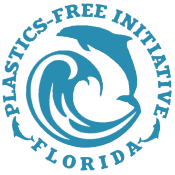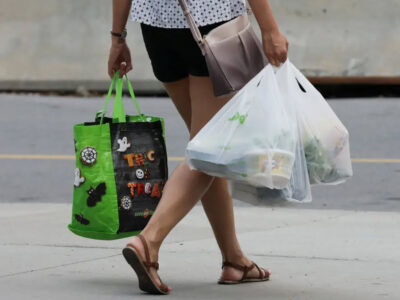Almost a decade ago, California became the first state in the United States to ban single-use plastic bags in an effort to tackle an intractable plastic waste problem.
Then came the reusable, heavy-duty plastic bags, offered to shoppers for ten cents. Designed to withstand dozens of uses, and technically recyclable, many retailers treated them as exempt from the ban.
But because they didn’t look much different from the flimsy bags they replaced, lots of people didn’t actually reuse them. And though they came emblazoned with a recycling symbol, it turned out that few, if any, actually were recycled.
The unhappy result: Last year, Californians threw away more plastic bags, by weight, than when the law first passed, according to figures from CalRecycle, California’s recycling agency.
Now, lawmakers are trying to fix that. A new bill seeks to ban all plastic bags offered at the checkout line, including the heavy duty kind. (Shoppers would still be able to pay for a paper bag.)
“It’s time for us to get rid of plastic bags all together,” said State Senator Ben Allen, a Democrat and a sponsor of the bill. By some accounts, California’s initial plastic bag ban was a well-meaning but failed experiment, an environmental rule that backfired and inadvertently made the matter worse. “We didn’t worry about the carve-out for these thicker bags in the early days,” said Mark Murray, director of Californians Against Waste, an advocacy group. “It just didn’t seem like they were going to be the thing that they ultimately became.”
The pandemic, which sparked concerns that carrying around reusable bags could spread the virus, led to “an explosion in these thicker plastic bags,” he said. Basically, people were using the thicker bags just once.
The average time shoppers used a plastic bag? Twelve minutes, according to the bill’s sponsors.
Some advocates say the initial ban would have been effective if properly enforced. The ban, adopted in 2014, allowed for plastic bags to be sold to shoppers only if they were widely recycled in California.
However, “No bag manufacturer or retailer could show any evidence of them being recycled,” said Jan Dell, founder of The Last Beach Cleanup, a nonprofit group. Over the past year, she’s led an effort to sue retailers that sell the thicker plastic bags, saying their sale is prohibited by the original ban.
Even if the new law passed, billions more bags would probably be sold before it came into effect in 2026, she said. “If the initial law was enforced, we would have no more of those bags, today.”

